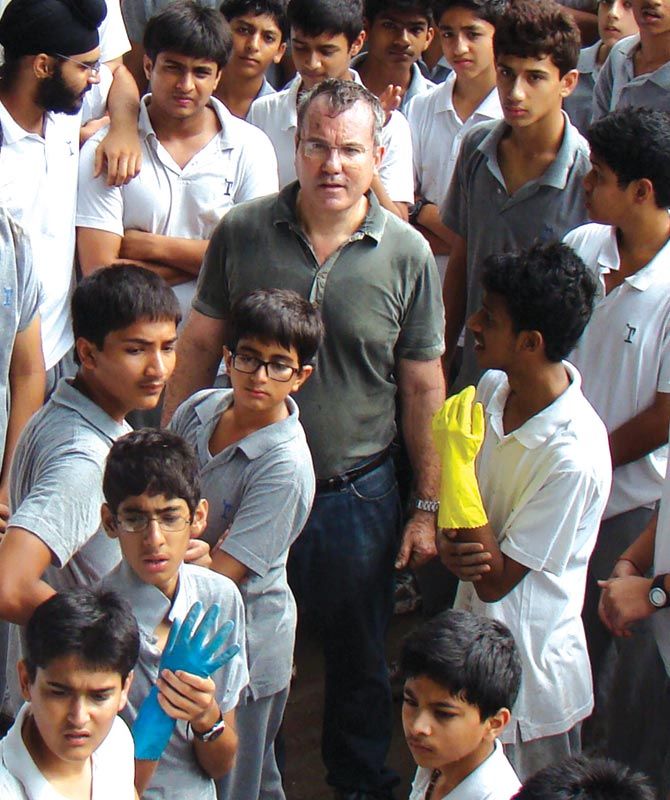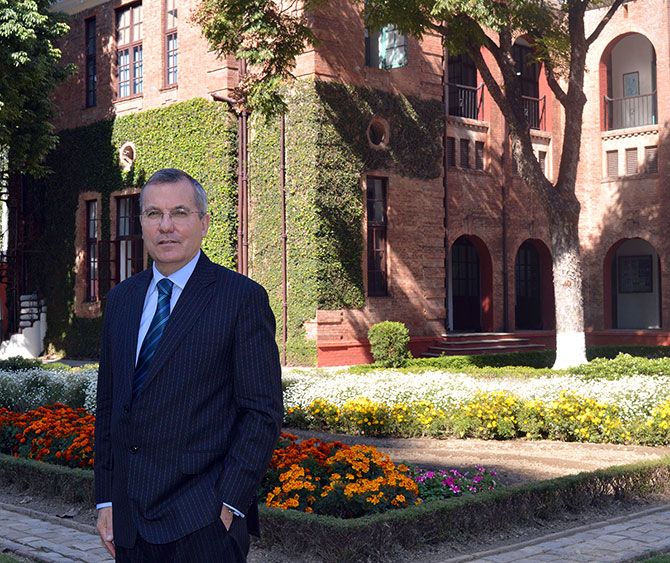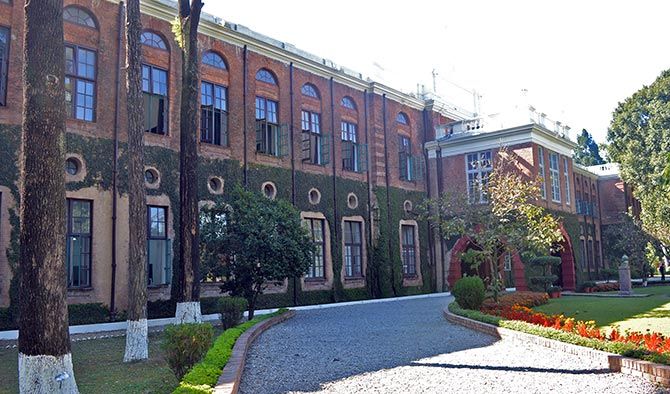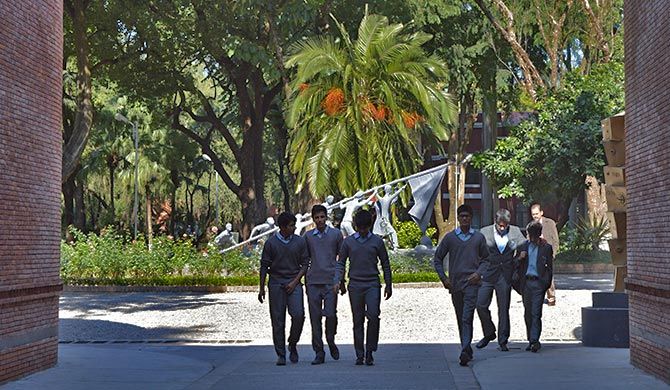'Never lose your optimism. Never lose your aspiration. And never -- even if India becomes a prosperous consumer society -- never ever lose that shining light in your eyes,' advises Dr Peter McLaughlin, headmaster of the Doon School.

Inside the ivy-covered brick building of the Doon School in Dehradun, a framed picture of Mahatma Gandhi hangs above the office entrance.
Up, the flight of stairs leading to the headmaster's office, are boards bearing the names of student achievers over the decades -- Prannoy Roy, Vikram Seth among the long list.
Others went on to do other interesting things -- Olympic Gold medalist Abhinav Bindra, Historian Ram Guha, Sculptor Anish Kapoor, Writer Amitav Ghosh, Businessman Gautam Thapar, Mahavir Chakra Awardee Rear Admiral Santosh Kumar Gupta, Prime Minister Rajiv Gandhi...
"We have boys who go out and make a difference in the world," says Headmaster Dr Peter McLaughlin, an Irishman who has previously served as headmaster of schools in Egypt, England and a lecturer of Modern History in Zimbabwe.
"I went to a school in Africa which was very similar to the Doon School -- in look, feel, scale, even traditions," says the historian-academic, sitting in his office, with sounds of an old school bell sounding in the background at every period break.
"I'd been looking for the Doon School all my life. It was homecoming."
Dr McLaughlin has an older connection with India -- his aunt, an Irish nun, was the mother superior of a convent in Madhya Pradesh for twenty years, before moving to Quetta in Pakistan. Being a historian by trade, he says he loves India's ancient civilisation and had been introduced to Indian curries as child by his mother while growing up in Africa.
In a meeting with Archana Masih/Rediff.com, Dr McLaughlin spoke about what it is to be the headmaster of India's best known boarding school and why a headmaster is never off duty.
Do the boys see you as a strict headmaster?
In an all boys institution you need very strong discipline because boys flourish best when they have very clear boundaries and when they know how far to go and where to stop.
If they have very porous boundaries as most boys in the world do now, they become very anarchic.
Girls have a natural propensity to cooperate within a system even when the boundaries aren't absolutely clear.
I've been the head of an all girls, a co-ed and all boys school, so I see that difference.
Yes, they see me as someone very strict, but very fair. I am not on a hair-trigger all that time, in that sense (laughs).

How traditional is the Doon School?
For a young school that's only 80 years old, we are powerfully traditional.
The best sort of education is a balanced education. One of the difficulties of legacy boarding schools around the world and particularly in India is that they haven't offered a genuine all round education. They have tended to focus on what's happening outside the classroom at the cost of what's happening inside.
My mission is to see that all round education means academics plus everything else. Otherwise, it is hyphen education.
Curriculum doesn't stop at the classroom walls. Internally, I've banned extra-curricular or co-curricular because everything is curriculum. A cricket match is curriculum -- and that's not some eccentric P G Wodehouse type character saying it.
The learning that you can get on a cricket pitch or up a mountain or doing social service is probably more important in terms of overall development than narrow focus on the classroom.
Our academic standards have also shot up in recent times, both in ISC and IB. Boys in successive years have gone to every major Ivy League university. We have three at Princeton at the moment.
So we are very traditional, but we are tradition plus, rather than tradition full stop.
It is said that schools like Doon have a colonial hangover. Has this school shed off its English cloak for an Indian kurta?
Every boy and every master is of Indian origin and we intend to keep it that way -- which may sound funny coming from me (laughs).
We have no intention of becoming an international school.
Over the years we have become more committed to ensuring that boys remain rooted in their Indianness, so we have NRI boys whose parents send them back for exactly that purpose.
I don't see an outstanding education necessarily as a manifestation of colonialism. An excellent education looks the same everywhere.
We have Hindustani classical music, Hindi dramatics and debating. In our literary festival last year we had Urdu and Marathi plays by the boys.
We are very conscious that we don't want to become a machine for creating narrow global citizens -- of people who think that the world is made up of duty free shops at airports. We want them to be rooted in India's intellectual heritage, it socio-economic realities, history and culture.
If one were to look at the boys at Doon School, what glimpse of India would they give?
We are an all India school. One little chap in class VII said to me: 'Sir it's such a privilege to meet boys from all over India. In my last school they were all basically the same.'
40% of our boys are on scholarships and rising, so in terms of our socio-economic diversity that is something we have been driving forward as well.
We have traditional customs such as no cell phones, expensive gadgets -- we are a cashless utopia -- every boy is allowed the same amount of money in the bank.
How much pocket money do the boys get?
They get a couple of thousand rupees which is put in the bank per term.
We also keep it low enough so that they have to work together -- so one will get the chocolate bar, the other the egg bun and break it into three.
Our boys are very communistic in one sense, we keep it spartan. It is not a country club. The tuck shop is not open everyday. If parents smuggle in tuck, we confiscate it because we want the boys to have a balanced diet.
We have the most obedient generation of parents in human history. They do exactly as their children say (laughs).
The boys actually like the simplicity of the life here. It is stripped down to the bare essentials -- comradeship, aspiration, achievement, team work.
You speak of the boys' simplicity within campus, but the Doon School is seen as an elite school.
I plead guilty to being an elite school. To me, elite means you have a meritocratic environment, where the best prosper, but we are not elitist.
People see us as a snobbish, expensive school -- we are absolutely not. We keep things basic, same uniform, same money -- every boy is equal.
I go out of the way not to know who the parents are, the only time I want to know about finances are if they are struggling so that we can help with financial aid.
Like I said, our boys are very communistic, but with a small c -- not signing up to Marxism or Leninism generally (laughs) -- but if a boy tries to flaunt his wealth, he becomes quickly isolated.
I have seen boys whose parents are malis or domestic help, walking in friendship groups with people who come from incredibly wealthy families. So it does work.

So you do have boys from such economically weak backgrounds?
Absolutely! We have an elite product because we have boys who go out and make a difference in the world because of this special education, but they are definitely not snobbish.
Everyone -- whatever their class, creed, religious background, socio-economic background, -- we've got them all -- vegetarians, non vegetarians, Jains, Muslims, Hindus, Christians, militant atheists, militant secularists -- and the community works extremely well.
I am relentless about keeping their feet on the ground.
It is what our founding headmaster said -- we want our boys to be an aristocracy but an aristocracy of unselfishness and service.
We have 25 social service projects. They roll up their sleeves, dig ditches, mix cement and pile bricks...
As an educator, do you think there is an over-emphasis on rote learning in India?
I think there is still a place of mastering a body of knowledge in your head and remembering is the foundation of all learning. You just can't rely on Google for everything.
We offer both the IB and ISC and when I am preparing boys for entry into top universities abroad and having open ended question sessions -- the contrast is colossal.
Boys that come up through the Indian board system are trapped in the two dimensional world; while the IB boys know how to apply that knowledge.
I see the genius of the Indian people and their ability to flourish. Put them in the right system and they just take off.
Sometimes I wonder if the ruling elite has had the desire to keep people imprisoned in this two-dimensional world at a conscious or unconscious level. The French colonialists in Indo-China used to say that educating the Indo-Chinese people wasn't one coolie less; it was one rebel more.
When you limit people's ability to understand, think and find creative solutions, you are not going to have a particularly revolutionary population. I don't want a revolutionary population, but we have to break out of selling people short.
What are some the changes that are needed?
The only thing that will break this deadlock is the examination at the end.
How do you assess children at the end of 10 or 12 years in school?
If you based your examination on extensive reading, discussions where questions are not predictable -- if you have an exam like that then you have no choice than to teach students towards that.
Until the government grips the question what happens in an examination at the end of your time in school, nothing will change.
No matter where you look in the world, every curriculum document will start off saying we want students to be enlightened citizens of a global society, but teachers look at what they need to do to get top marks for their students.
Unfortunately you look at every Indian final exam -- what the teacher has to do is to train students to identify questions that would have been seen before and to remember what they have been taught in class and in text books and replicate that in the exam.
Make an exam a memory test and students will just memorise stuff of 15 years. Think of all that creativity, potential which is not being stretched, examined and assessed.
In terms of creating the next generation of technological or socio-economic innovation, we are selling short.
I would love to create an IB, but it would be an 'Indian Baccalaureate,' not an 'International Baccalaureate.'

What ails higher education in India?
The Achilles heel of higher education is that research is divorced from teaching.
What gives the Western university model huge strength is that you have to be a researcher first and a teacher second. The students' learning in your lectures and seminars is rooted in your own learning.
Until we integrate the research and teaching function within universities, we are going to struggle. Teachers have to first and foremost be learners.
It is often said that children who go to public schools are far removed from the real India.
In that sense we are lucky because we live in a relatively small city and have 25 social service programmes, where boys take surplus food to the slums, then there are village projects, women empowerment projects, we support two schools at the edge of town etc.
They all have to do minimum compulsory engagement with the world outside, otherwise you end up in this bubble of self congratulation.
We are very tough on the boys about their responsibilities as citizens. We are committed to creating a truly meritocratic India.
You have worked in Egypt, England, Zimbabwe -- is there anything that sets Indian pupils apart?
There is a light in the eyes of Indian students. It is optimistic, aspirational. That is why I believe in Project India because I see that light shining. There's a dead flatness in the eyes of a lot of Western teenagers.
We Irish are a chaotic people in a funny sort of way. I like the sense of energy, optimism in India for the future. It is intoxicating and being a historian by trade, I love India's ancient civilisation.
Is a headmaster ever off duty?
I don't have a life, I have a school! And that's not a complaint.
I believe a school should be like an idiosyncratic village where you come across every type of human being.
What message do you have for Indian school children?
Never lose your optimism. Never lose your aspiration and never -- even if India becomes a prosperous consumer society -- never ever lose that shining light in your eyes.











 © 2025
© 2025